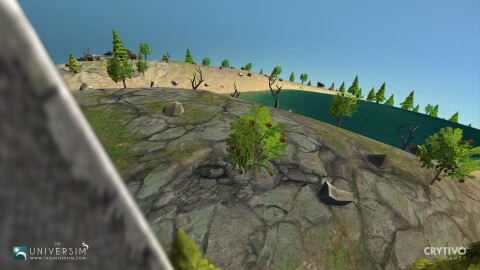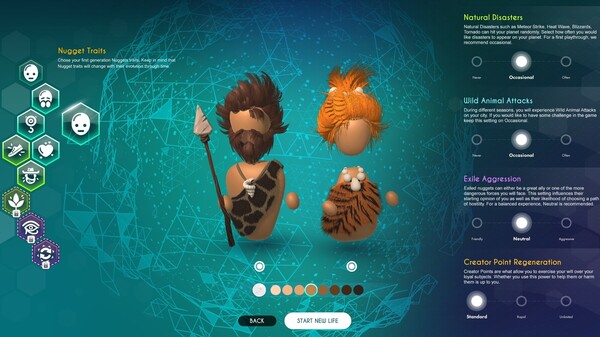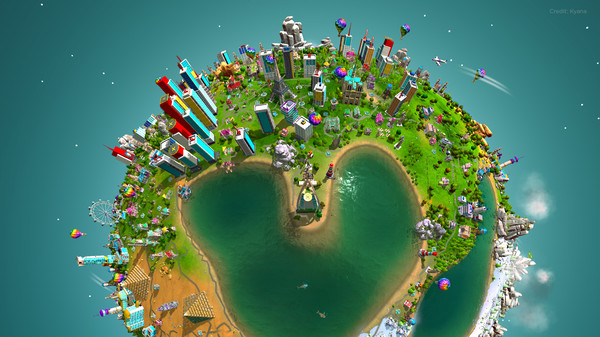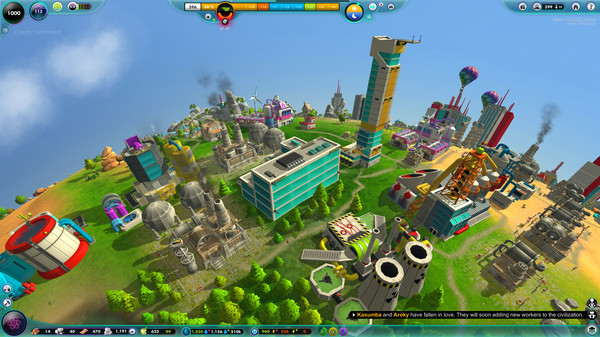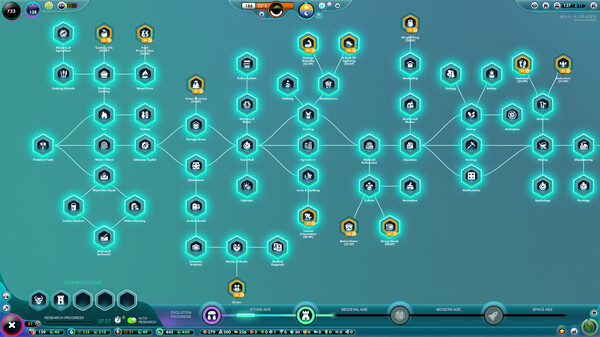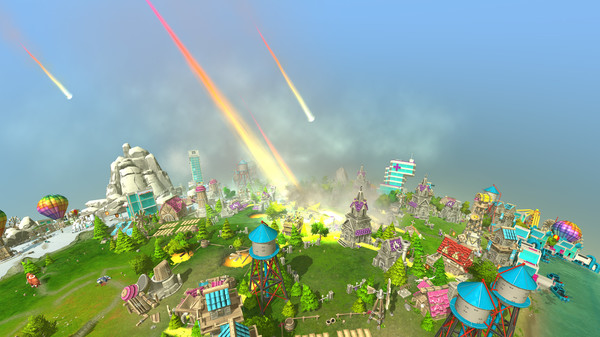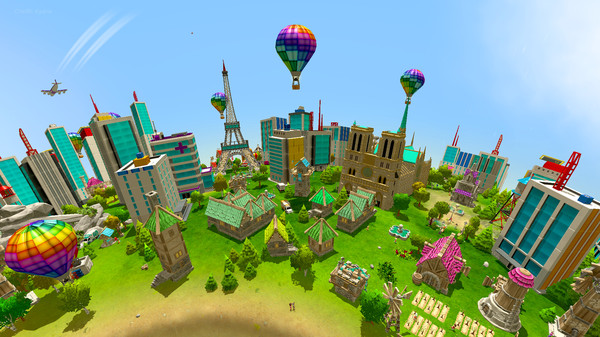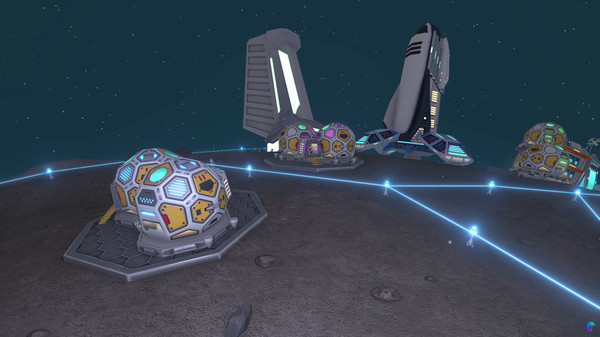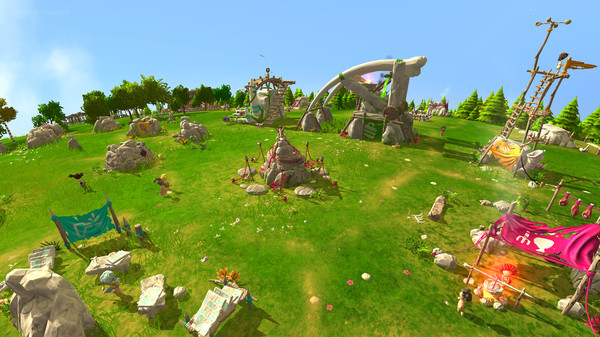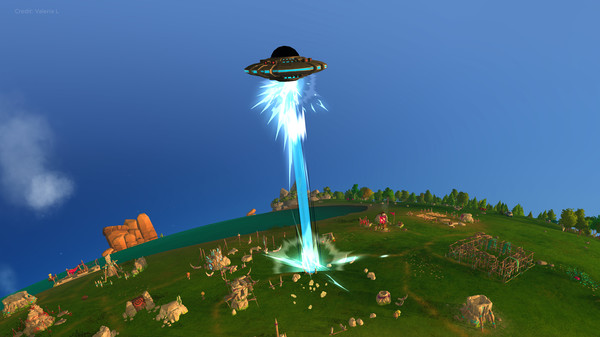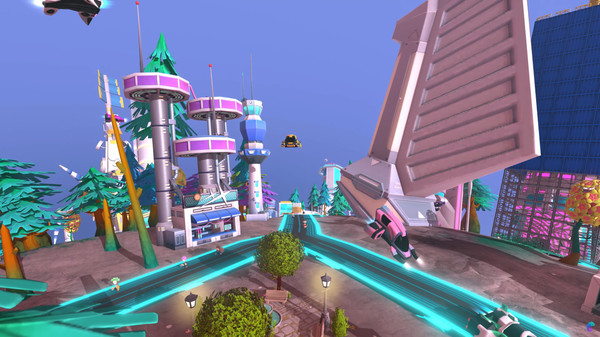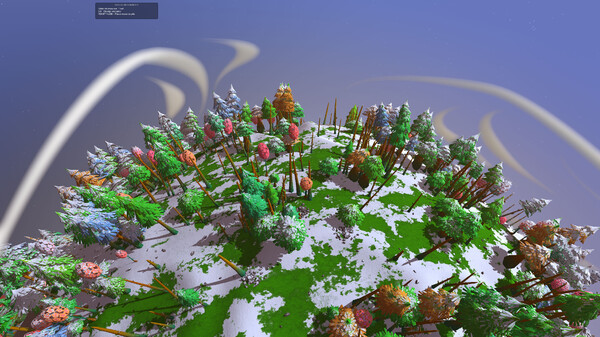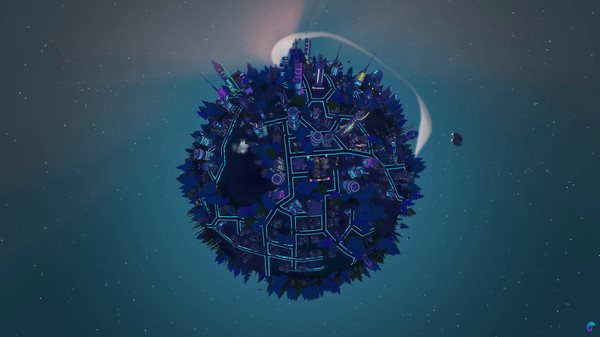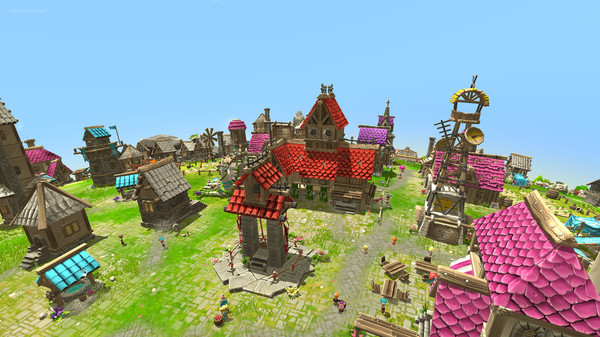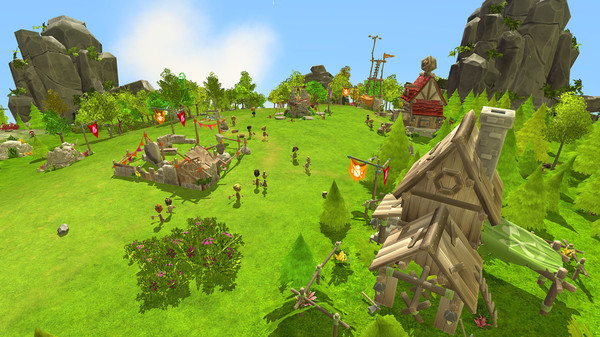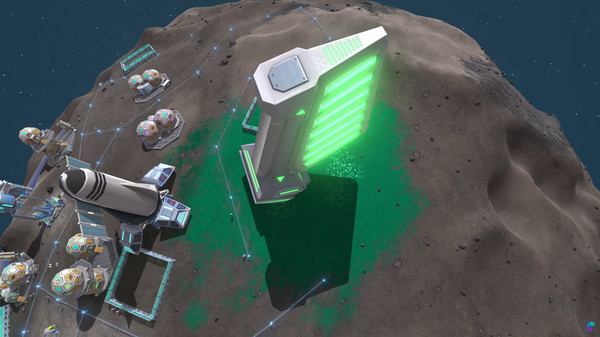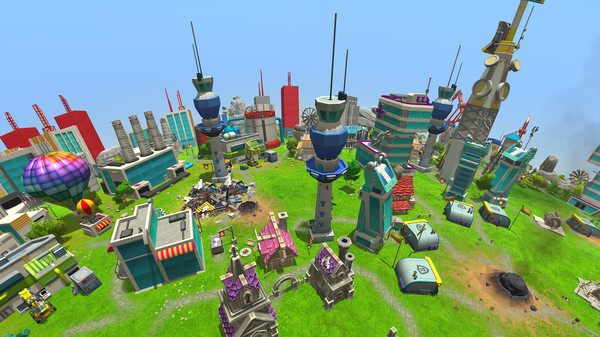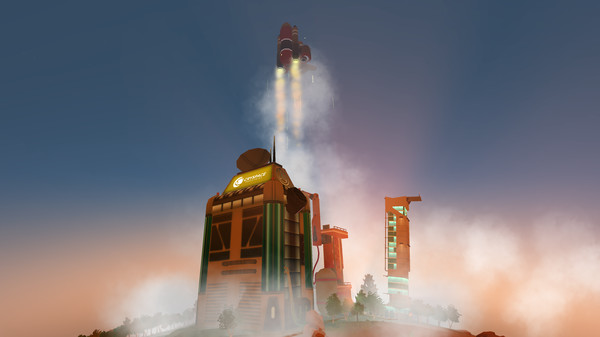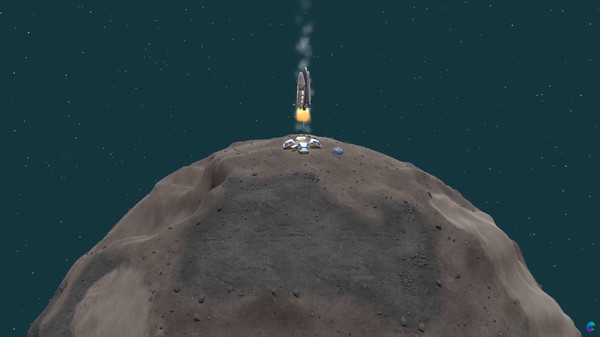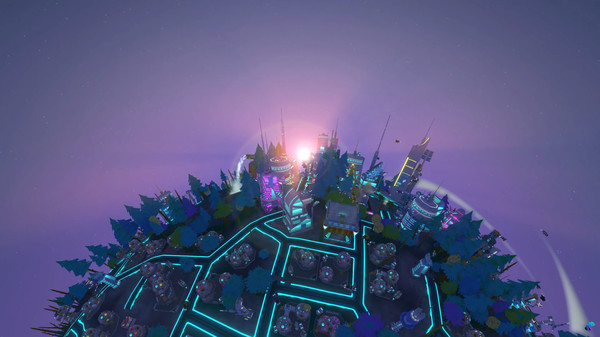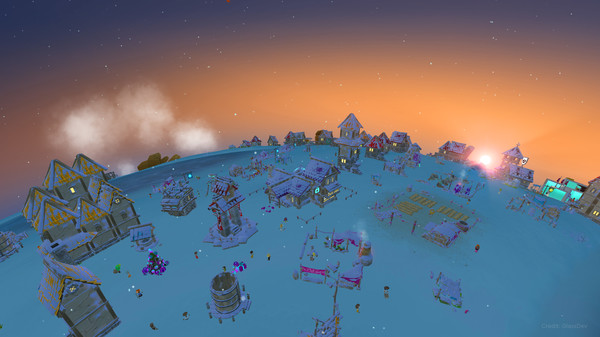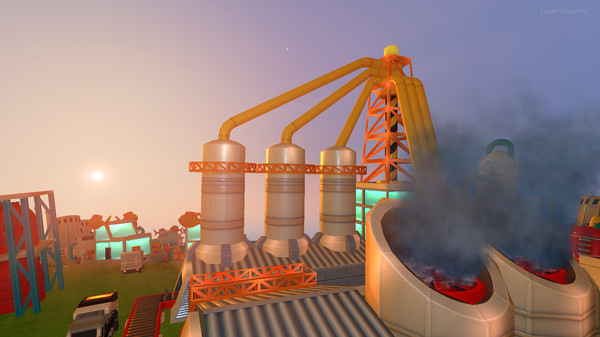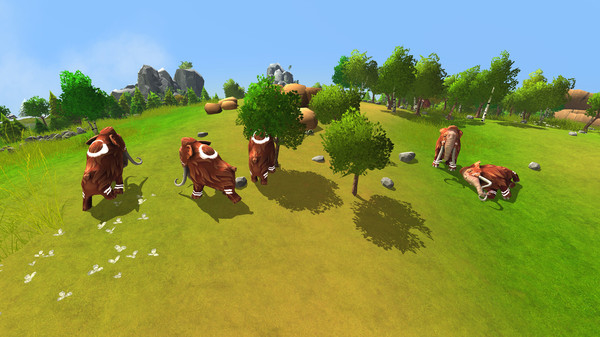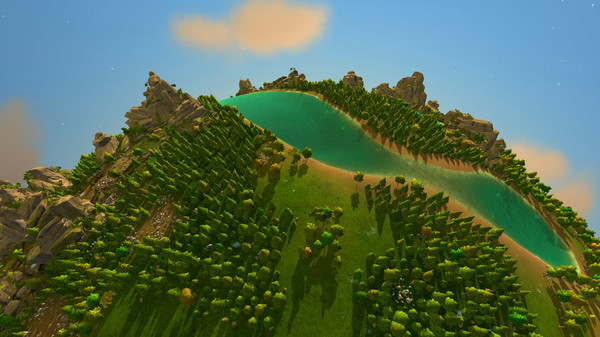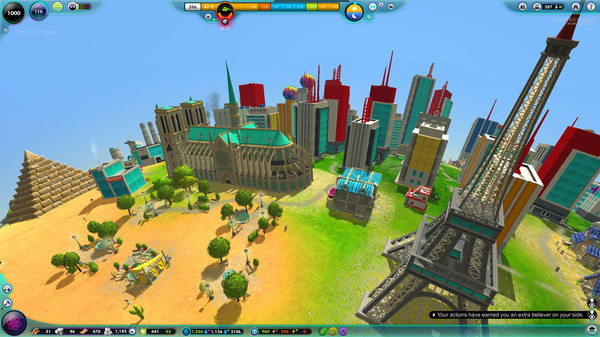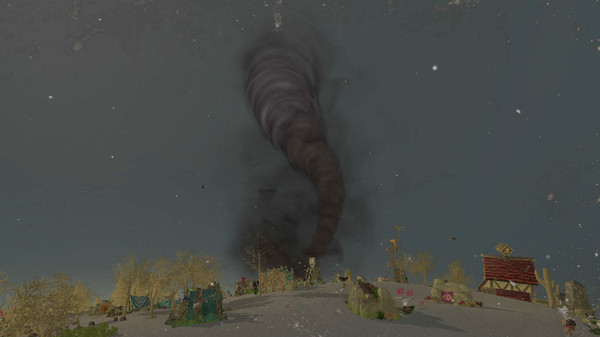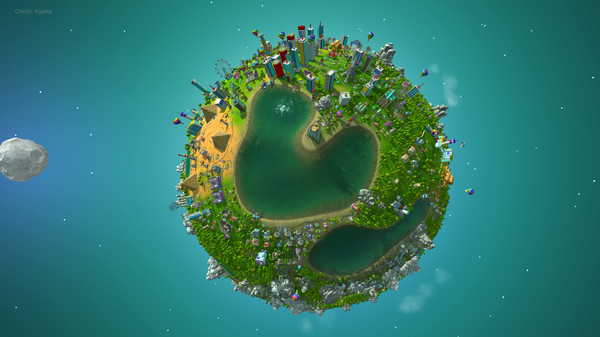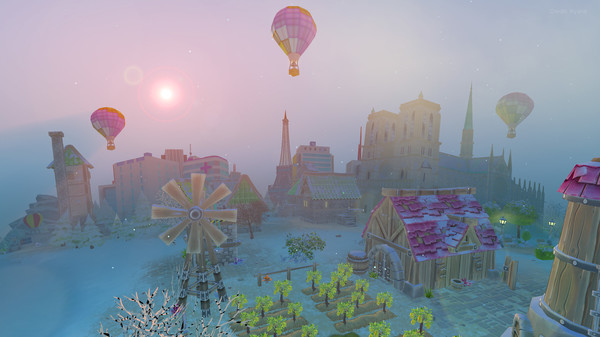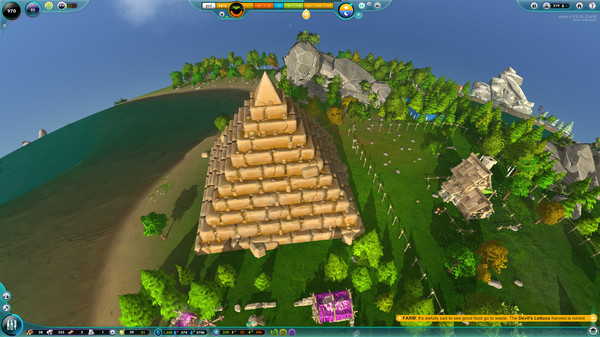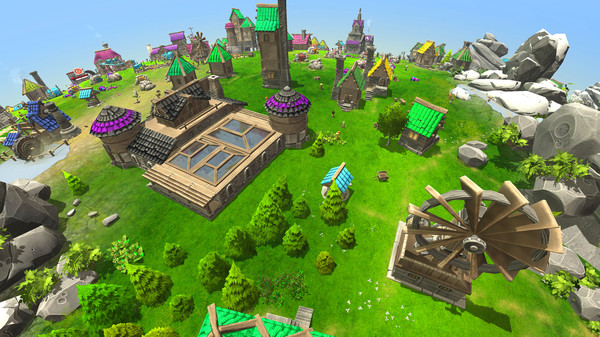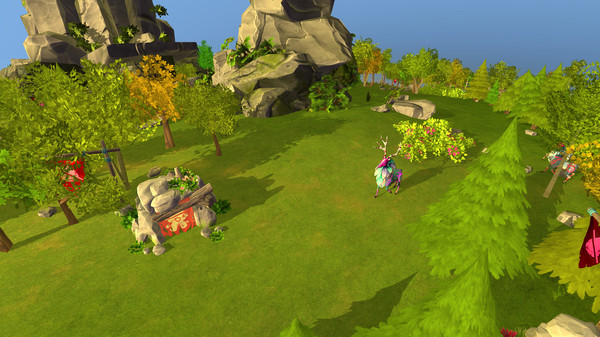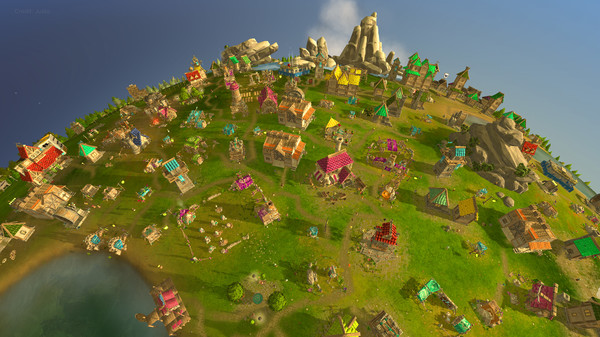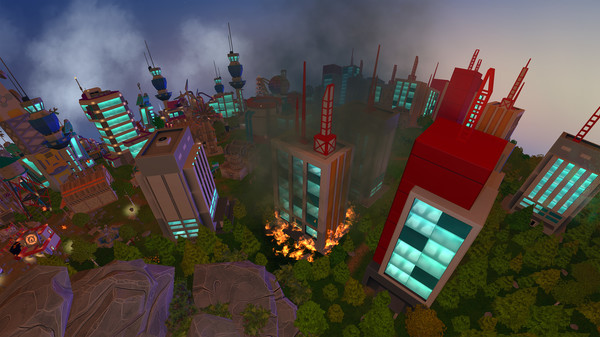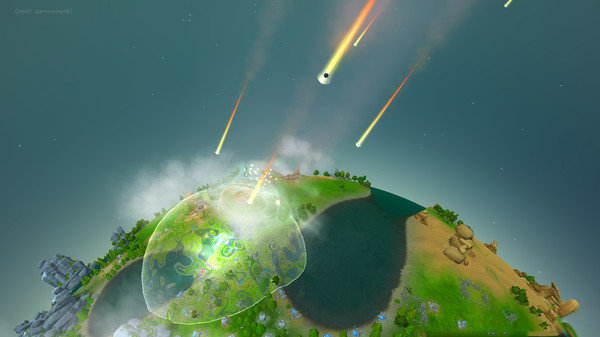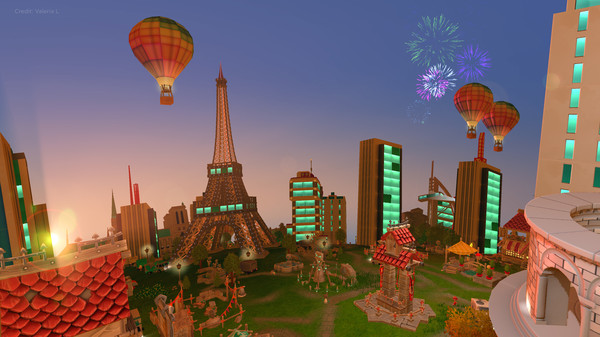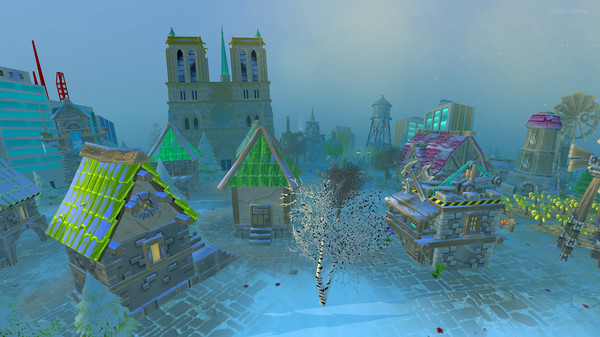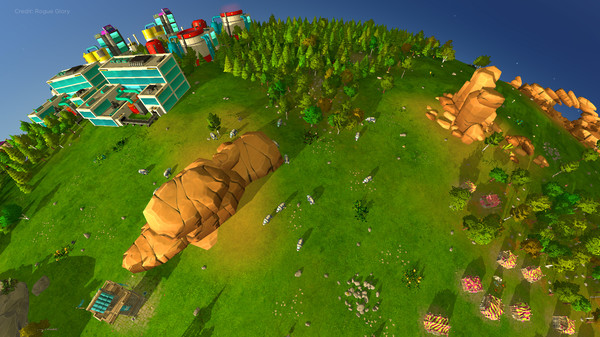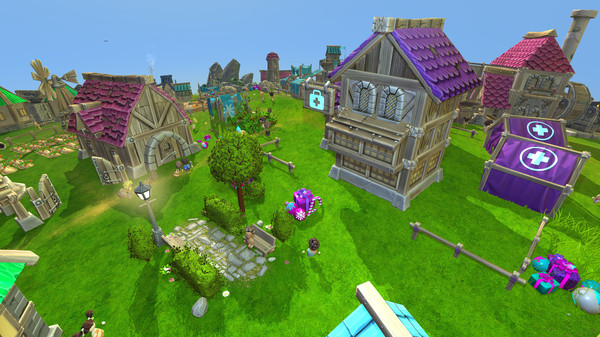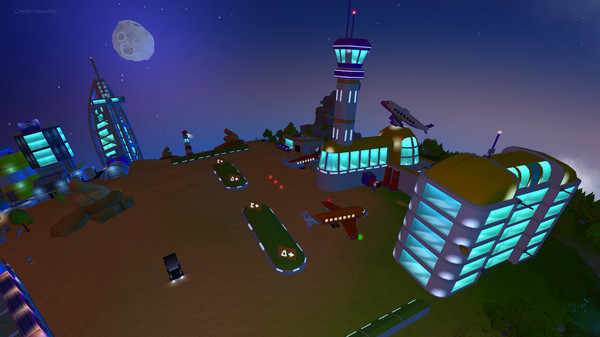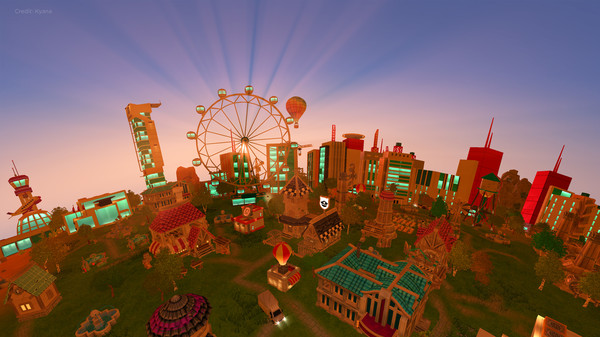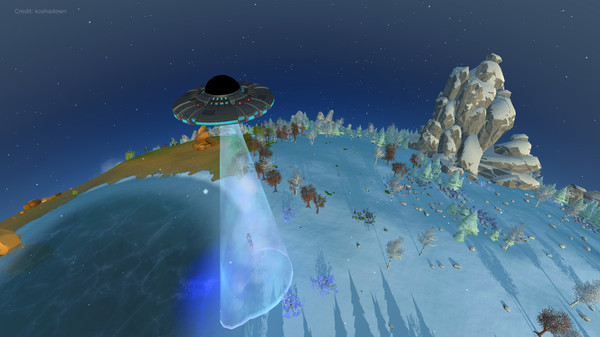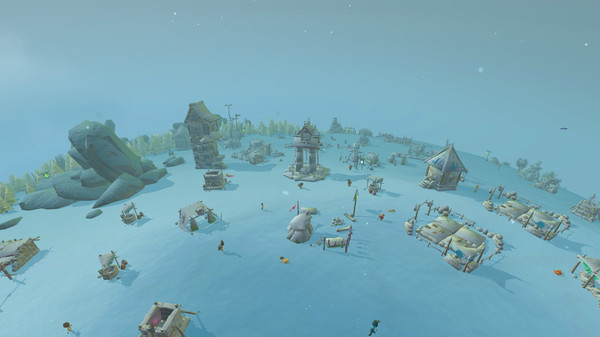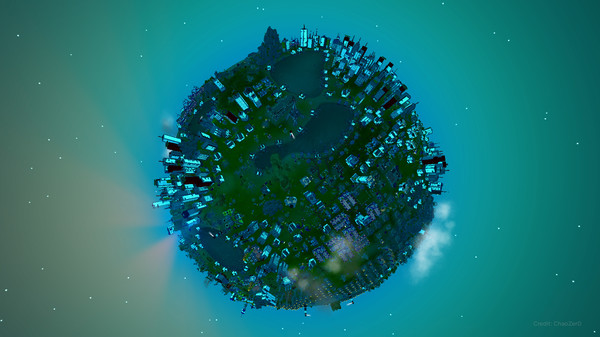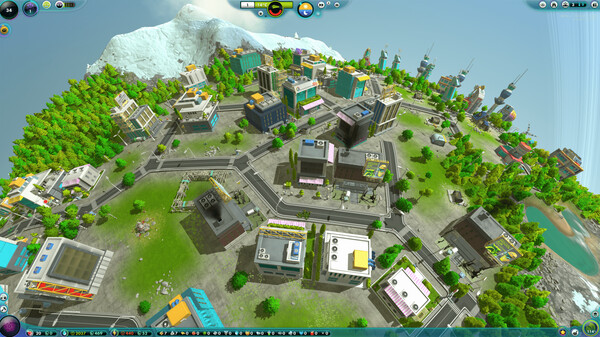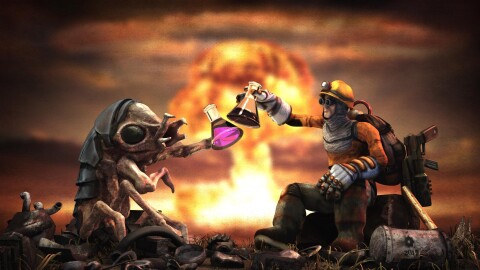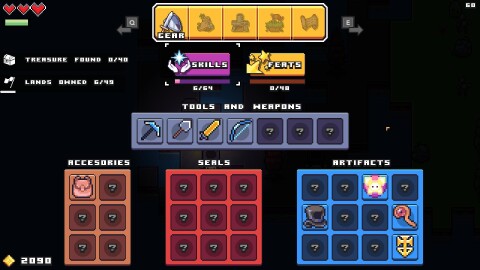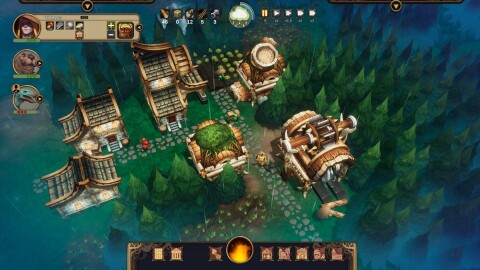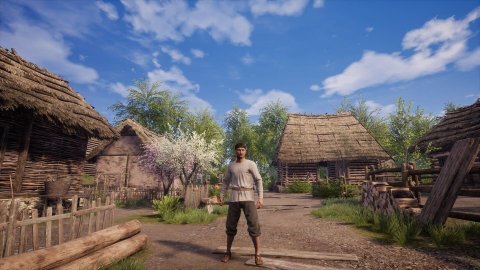The Universim aims to revive the glory days of the god-game genre, and bring it into the new generation with fresh ideas and ambitious gameplay. With the powers of a god, you are unleashed upon the universe to begin forging your galactic empire in the stars. From dust to the cosmos beyond, your civilization will rise through the ages under your guidance. Yet, this is not the same static world you may be accustomed to, this is a dynamic, living world that is just as unpredictable as it is beautiful. Everything in The Universim revolves around dynamic gameplay. No two planets will ever be the same, natural disasters and other events can be triggered at any time, and the AI will react to the world in an organic and believable way. Although, it wouldn’t be any fun if things don’t get a little silly every now and then.
Your citizens (Nuggets) will make their own decisions and always seek to better the civilization in some way, but, at times, things may not always go to plan. Fortunately, you are there to keep them on the straight and narrow. Or, rather, to keep them from getting themselves killed, at least. One such situation that may arise from bad decision-making is that two or more AI cities declare war on one another. You then have an important choice to make: intervene and attempt to bring an end to the chaos, or simply watch as they destroy one another. Some people just want to watch the world burn, and we’re okay with that.
Research plays a pivotal role in The Universim, and is therefore an area that will require your utmost attention. Without certain discoveries or technology, your civilization may not even be able to progress beyond the Stone Age. For instance, fire is a crucial invention to ensure the warmth and safety of your early civilization, amongst other useful applications. New research options become available as your civilization progresses through the ages.
Learn More About Nuggets
Due to the dynamism of the game, natural disasters, alien visitors, disease, war, famine, riots, and so much more can be thrown at your civilization at any time. All of these factors will leave their mark on the civilization, but can be dealt with in numerous ways. When something like the plague strikes, it is up to you to quickly strategize on how you will help your civilization overcome this disaster. The way in which you fight certain disasters varies from era to era, depending on the current research level and available technology.
When it comes to disasters, the world itself is not the only bringer of doom. You, too, can trigger disasters if you are displeased with your civilization’s decisions. Your influence over the world is dependent on two basic elements, Power and Wrath. Power comes from having a loyal civilization under your control. Successful completion of tasks and other activities will generate the Power you need to alter the very world itself, such as changing the weather or triggering events. It can also be used to initiate a major civilization action. Conversely, if your civilization begins to lose loyalty due to failed events, every action they perform that displeases you will generate Wrath. This, in turn, allows you to unleash destruction upon them at any time.
The more loyal a civilization is, the better they will follow your orders. Sometimes, you just need to remind them who is boss. What better way to do that than to send a meteor down with a friendly note strapped to the side? There are also less destructive ways of maintaining loyalty, though. You kind of need a civilization to exist in the first place if you plan to rule over one. Although, it’s sometimes just fun to blow things up, isn’t it? You monster.
Disasters will also have many simulated secondary effects. Something like a meteor crashing into the planet will not only leave a sizeable crater, but it could also set trees and buildings on fire. Fires spread dynamically, making it rather dangerous for any structures or citizens within range. However, YOU can prevent forest fires! By wielding your Creator Abilities, you can drag a storm cloud over the impact zone and cool the situation down before things get out of hand. Creator abilities are your way of interacting directly with the world and assisting with various issues that may arise. These kinds of abilities drain Power, though, so use them wisely!
Buildings and society will evolve as you progress from era to era. Every era will bring with it entirely new types of buildings that will impact your civilization in some way. All buildings will be constructed around what we call The Epicenter, the central heart of every city in the game. You can place an Epicenter in any feasible region on the planet that supports cities, and buildings will begin developing around it as your population grows. Normal housing structures can be built automatically, but you will need to explicitly choose where special buildings go up. Special buildings include things like farms and nuclear power plants. Civilization development and expansion is based on the conditions around your Epicenters. In certain environments, your population and buildings will grow faster. However, in cold environments, deserts, and other rather inhospitable areas, resources like food may be scarce and will thus hinder development.
In a vibrant, living world driven by dynamic events, realistic natural processes, and ever-changing environments, you need an in-game simulation engine that is capable of going above and beyond expectations. This is what the Prometheus In-Game Engine™ aims to be. Developed from the ground up in Unity3D, it will form the foundation upon which every element in the game is built.
Thanks to Prometheus, every planet you encounter in the game will be as unique and vibrant as the last. Doesn’t random generation rock? You will come across planets with varying temperatures and environmental conditions, as well as a wide range of characteristics that make them special. Planets will also undergo the changing of seasons, which affects the many environmental biomes on the planet. It has the potential to cause rapid changes in temperature and conditions, leading to a significant change in the rate of resource gathering and civilization development.
Seasons will change according to the in-game timeline. Summer offers the best food yield and growth period due to its favourable weather, while winter can have a negative impact on the wellbeing of your civilization. Some winters may go by quickly, while others will drag on. There is even a chance for the most brutal winter of all to ravage your civilization for months on Mother Planet. Fortunately, our in-game News System will inform you about upcoming winters, giving you enough time to react and begin preparing for the long winter months ahead by storing food and researching the appropriate technologies. Fire, clothing, storage of food, and building shelters are all excellent examples of proper preparation.
The space era will be the culmination of all your hard work. All of the decisions you have made thus far will truly begin to bear fruit or reveal their consequences, if any exist. This is when you will begin to discover all of the beauty and mercilessness of alien planets.
Colonization plays a huge role in the Space Era, as it allows you to spread your civilization across the stars. New research opportunities, technologies, resources, and more can be discovered by exploring and colonizing planets! However, colonizing a planet requires a little preparation beforehand. Simply hitting the GO button when initiating a mission will likely result in unhappy endings. If adequate research about the planet is not done, it may lead to the untimely demise of your colonization team. After all, it can be rather difficult to traverse molten lava while fending off giant space mosquitoes with nothing but a tube of sunblock! Even more so, if they happen to be wearing the previous mission's sub-zero equipment.
Every planet in the game can be colonized. They may just require a dash of scientific magic to make them habitable. Certain planets could even possess extremely valuable resources, but there is always a catch. Such planets may also have a ticking timer attached to them, indicating that the planet is going to explode or the sun is minutes away from going supernova. Are you brave enough to risk it all and attempt to harvest those resources before time runs out? There is always the option to leave the planet to die in peace, of course. You may already have a cargo hold full of valuable resources and new discoveries. It would be a shame to see all of that go to waste! Oh, and your poor colonization team, too. Imagine all the paperwork…
Naturally, the hardships may not always end at having to harvest all of the resources before the timer hits zero. The planet could still have unsuitable conditions for your team to get the job done. You will most likely need to place atmosphere generators to generate air and thermal regulators to keep the temperatures on the planet at suitable levels. It’s not going to be an easy process, but the rewards may just be worth it.
Most alien planets will also likely have a few strange creatures roaming around. Some may be friendly, and could even become good friends with your crewmembers. Others have sharp teeth and a general dislike for everything that moves. Better pack a few weapons as a precaution! You will encounter many unique and interesting creatures, vegetation, and environments in your travels. Be sure to send any interesting combinations you find to us! Prometheus might get a little ‘creative’ sometimes.
A lot of extra detail is planned to go into numerous planets in The Universim. You can expect to find many easter-eggs and secrets scattered across the universe. There are even plans to possibly include mod support somewhere down the line. After all, no modern game would be complete without inappropriately-shaped rocket ships!
By utilizing an intuitive GUI, you can keep track of the various planets in the universe and manage your intergalactic endeavours with ease. Every star in the sky is actually a different planet that you can discover and explore. This is another area where research and technology can make or break your experience. One such technology is the Discovery Rover. This vehicle can be sent to distant planets to acquire information about the conditions, colonization requirements, hidden dangers, and available resources. However, as with everything else, you will need to prepare your Rover adequately for the mission. Additional technologies like Environmental Armour, Thermal Shielding, weaponry, resource probes, and more will need to be acquired in order to get the most out of your rover and protect it from the dangers of alien planets. There is even the ability to add an all-purpose camera to it, which allows you to take direct control and drive it on alien planets! Did someone say VR? We might have. Maybe.
What will you do with the power to control the universe? With the fate of galaxies resting in your hands, and the fragile lives of so many under your influence, there is no telling what you may accomplish. Through your every decision, you are writing the history of a species. This is your story now, so make it one to remember.
Your citizens (Nuggets) will make their own decisions and always seek to better the civilization in some way, but, at times, things may not always go to plan. Fortunately, you are there to keep them on the straight and narrow. Or, rather, to keep them from getting themselves killed, at least. One such situation that may arise from bad decision-making is that two or more AI cities declare war on one another. You then have an important choice to make: intervene and attempt to bring an end to the chaos, or simply watch as they destroy one another. Some people just want to watch the world burn, and we’re okay with that.
Research plays a pivotal role in The Universim, and is therefore an area that will require your utmost attention. Without certain discoveries or technology, your civilization may not even be able to progress beyond the Stone Age. For instance, fire is a crucial invention to ensure the warmth and safety of your early civilization, amongst other useful applications. New research options become available as your civilization progresses through the ages.
Learn More About Nuggets
Due to the dynamism of the game, natural disasters, alien visitors, disease, war, famine, riots, and so much more can be thrown at your civilization at any time. All of these factors will leave their mark on the civilization, but can be dealt with in numerous ways. When something like the plague strikes, it is up to you to quickly strategize on how you will help your civilization overcome this disaster. The way in which you fight certain disasters varies from era to era, depending on the current research level and available technology.
When it comes to disasters, the world itself is not the only bringer of doom. You, too, can trigger disasters if you are displeased with your civilization’s decisions. Your influence over the world is dependent on two basic elements, Power and Wrath. Power comes from having a loyal civilization under your control. Successful completion of tasks and other activities will generate the Power you need to alter the very world itself, such as changing the weather or triggering events. It can also be used to initiate a major civilization action. Conversely, if your civilization begins to lose loyalty due to failed events, every action they perform that displeases you will generate Wrath. This, in turn, allows you to unleash destruction upon them at any time.
The more loyal a civilization is, the better they will follow your orders. Sometimes, you just need to remind them who is boss. What better way to do that than to send a meteor down with a friendly note strapped to the side? There are also less destructive ways of maintaining loyalty, though. You kind of need a civilization to exist in the first place if you plan to rule over one. Although, it’s sometimes just fun to blow things up, isn’t it? You monster.
Disasters will also have many simulated secondary effects. Something like a meteor crashing into the planet will not only leave a sizeable crater, but it could also set trees and buildings on fire. Fires spread dynamically, making it rather dangerous for any structures or citizens within range. However, YOU can prevent forest fires! By wielding your Creator Abilities, you can drag a storm cloud over the impact zone and cool the situation down before things get out of hand. Creator abilities are your way of interacting directly with the world and assisting with various issues that may arise. These kinds of abilities drain Power, though, so use them wisely!
Buildings and society will evolve as you progress from era to era. Every era will bring with it entirely new types of buildings that will impact your civilization in some way. All buildings will be constructed around what we call The Epicenter, the central heart of every city in the game. You can place an Epicenter in any feasible region on the planet that supports cities, and buildings will begin developing around it as your population grows. Normal housing structures can be built automatically, but you will need to explicitly choose where special buildings go up. Special buildings include things like farms and nuclear power plants. Civilization development and expansion is based on the conditions around your Epicenters. In certain environments, your population and buildings will grow faster. However, in cold environments, deserts, and other rather inhospitable areas, resources like food may be scarce and will thus hinder development.
In a vibrant, living world driven by dynamic events, realistic natural processes, and ever-changing environments, you need an in-game simulation engine that is capable of going above and beyond expectations. This is what the Prometheus In-Game Engine™ aims to be. Developed from the ground up in Unity3D, it will form the foundation upon which every element in the game is built.
Thanks to Prometheus, every planet you encounter in the game will be as unique and vibrant as the last. Doesn’t random generation rock? You will come across planets with varying temperatures and environmental conditions, as well as a wide range of characteristics that make them special. Planets will also undergo the changing of seasons, which affects the many environmental biomes on the planet. It has the potential to cause rapid changes in temperature and conditions, leading to a significant change in the rate of resource gathering and civilization development.
Seasons will change according to the in-game timeline. Summer offers the best food yield and growth period due to its favourable weather, while winter can have a negative impact on the wellbeing of your civilization. Some winters may go by quickly, while others will drag on. There is even a chance for the most brutal winter of all to ravage your civilization for months on Mother Planet. Fortunately, our in-game News System will inform you about upcoming winters, giving you enough time to react and begin preparing for the long winter months ahead by storing food and researching the appropriate technologies. Fire, clothing, storage of food, and building shelters are all excellent examples of proper preparation.
The space era will be the culmination of all your hard work. All of the decisions you have made thus far will truly begin to bear fruit or reveal their consequences, if any exist. This is when you will begin to discover all of the beauty and mercilessness of alien planets.
Colonization plays a huge role in the Space Era, as it allows you to spread your civilization across the stars. New research opportunities, technologies, resources, and more can be discovered by exploring and colonizing planets! However, colonizing a planet requires a little preparation beforehand. Simply hitting the GO button when initiating a mission will likely result in unhappy endings. If adequate research about the planet is not done, it may lead to the untimely demise of your colonization team. After all, it can be rather difficult to traverse molten lava while fending off giant space mosquitoes with nothing but a tube of sunblock! Even more so, if they happen to be wearing the previous mission's sub-zero equipment.
Every planet in the game can be colonized. They may just require a dash of scientific magic to make them habitable. Certain planets could even possess extremely valuable resources, but there is always a catch. Such planets may also have a ticking timer attached to them, indicating that the planet is going to explode or the sun is minutes away from going supernova. Are you brave enough to risk it all and attempt to harvest those resources before time runs out? There is always the option to leave the planet to die in peace, of course. You may already have a cargo hold full of valuable resources and new discoveries. It would be a shame to see all of that go to waste! Oh, and your poor colonization team, too. Imagine all the paperwork…
Naturally, the hardships may not always end at having to harvest all of the resources before the timer hits zero. The planet could still have unsuitable conditions for your team to get the job done. You will most likely need to place atmosphere generators to generate air and thermal regulators to keep the temperatures on the planet at suitable levels. It’s not going to be an easy process, but the rewards may just be worth it.
Most alien planets will also likely have a few strange creatures roaming around. Some may be friendly, and could even become good friends with your crewmembers. Others have sharp teeth and a general dislike for everything that moves. Better pack a few weapons as a precaution! You will encounter many unique and interesting creatures, vegetation, and environments in your travels. Be sure to send any interesting combinations you find to us! Prometheus might get a little ‘creative’ sometimes.
A lot of extra detail is planned to go into numerous planets in The Universim. You can expect to find many easter-eggs and secrets scattered across the universe. There are even plans to possibly include mod support somewhere down the line. After all, no modern game would be complete without inappropriately-shaped rocket ships!
By utilizing an intuitive GUI, you can keep track of the various planets in the universe and manage your intergalactic endeavours with ease. Every star in the sky is actually a different planet that you can discover and explore. This is another area where research and technology can make or break your experience. One such technology is the Discovery Rover. This vehicle can be sent to distant planets to acquire information about the conditions, colonization requirements, hidden dangers, and available resources. However, as with everything else, you will need to prepare your Rover adequately for the mission. Additional technologies like Environmental Armour, Thermal Shielding, weaponry, resource probes, and more will need to be acquired in order to get the most out of your rover and protect it from the dangers of alien planets. There is even the ability to add an all-purpose camera to it, which allows you to take direct control and drive it on alien planets! Did someone say VR? We might have. Maybe.
What will you do with the power to control the universe? With the fate of galaxies resting in your hands, and the fragile lives of so many under your influence, there is no telling what you may accomplish. Through your every decision, you are writing the history of a species. This is your story now, so make it one to remember.

